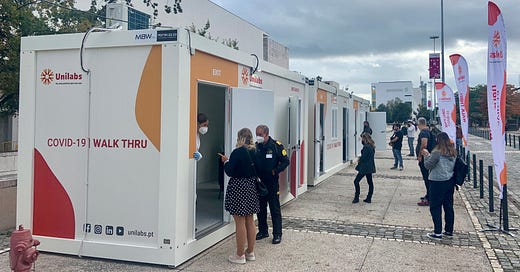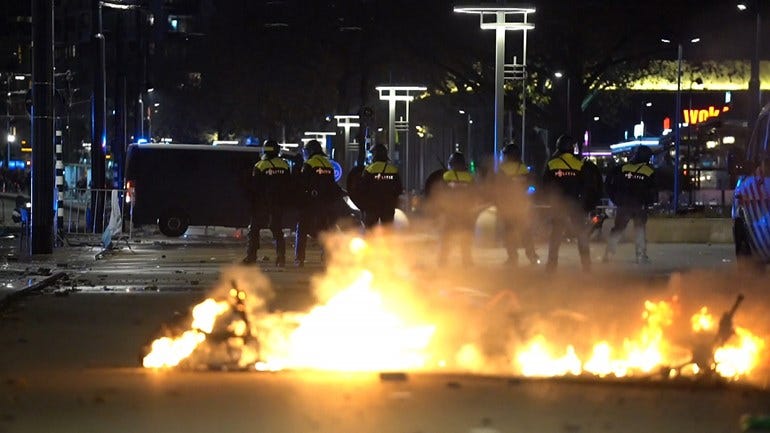Having returned from some six weeks in Europe, I just realized how much time I spent there ‘testing’. First was the pricey antigen test on our way from Vancouver to Amsterdam. Easy enough, although no one seemed to be sure we really needed it, but better safe than sorry. The setbacks started upon arriving in The Netherlands as the Dutch government had just decided to make QR codes indicating that you are Covid-free mandatory for all restaurant and bar visits. Fine, I was ‘boostered up’ so I was way ahead of the Dutch, however the Canadian QR code was not accepted on the Euro-centric platform. Luckily, in almost every city you could do an antigen-test that would generate a European QR code valid for 24 hours and the good part was that it was free as opposed to the extortion taking place at Vancouver airport. A website called ‘Testing for Access’ made the whole process actually quite easy. And if you were smart you could time the QR code: if you tested around lunchtime you could grab lunch, drinks and dinner on the same day and breakfast and maybe even lunch the next day as well before the thing expired.
Of course, it was somewhat uncomfortable as you are lining up for the nose-swab, explaining that you live in Canada and are fully vaccinated, surrounded by all sorts of non-vaxxers who needed the same test to go partying. It made me realize that the Dutch government was actually - rather than just managing safe access - gathering data on infections and the behaviours of people who required the test. In doing this they were able to track my journey across the country and determine exactly where Pieter was and what he was eating and drinking. Not that it matters in my case of course, but the many unvaccinated youngsters lining up with me must have provided some useful data for the health authorities.
How different was the scene in Portugal where under the guidance of a military guy the country has hit a 98% vaccination rate and where people dutifully wear their masks wherever they are asked to do so (something the Dutch have stopped doing altogether pretty much, too soon of course). In that setting the Web Summit in Lisbon took place: some 40,000 attendees were all masked and each day your vaccination status was checked upon entry. If you could not provide the right paperwork, no problem, a local outfit called Unilabs had set up facilities across the conference where you could test anytime you liked. Test, test, test. Luckily, the organization accepted the just released Canadian federal digital document and that made entry for us a lot easier, but the uncertainly about it all had kept us busy for quite a few days.
On the way back to Amsterdam from Lisbon we had to fill out a piece of paper the Dutch government had provided where you were asked to indicate the ‘runny nose’ and ‘fever’ scenarios, making it clear we would be booted off the flight if we had any of these. Of course, like the first flight from Vancouver arriving in Amsterdam, no one bothered to ask us for the completed form, before or after the flight. A totally pointless exercise and the completed forms went straight into the bin, the Dutch efficiency only goes so far. That attitude, together with a few weeks of testing data, must all have pointed to the fact that infections were on the rise. As I write this the Dutch are registering a daily 20k new infections, are back in a ‘partial lockdown’ and are thinking of junking the whole free ‘testing for access’ scheme: vaccinate or demonstrate you have recovered, otherwise forget about eating, drinking and partying out. To make the pain even worse, all sports events had to go without public, yet again.
I am not going to argue the Portuguese are smarter than the Dutch, but it seems that their somewhat more disciplined approach has yielded a much safer and relatively open society. What’s more, bars and restaurants can be accessed without QR codes and the lockdowns seem behind them. At the same time in The Netherlands an ‘orgy of violence’ - the words of Rotterdam mayor Aboutaleb - erupted last Friday as rioters and angry youngsters used the new Covid measures and closed nightlife as a pretext to set the downtown area on fire. The local police was so threatened that it was forced to open fire on the crowd causing even further headaches for the government.
To close the loop, the return to Canada required a pricey PCR-test which I managed to do for only $100 at one of the government run test centers in Rotterdam. Note: it is required to take the test within 72 hours before boarding the flight home. That means in essence another three days to get infected with Covid, but hey, you got your negative PCR test in the pocket and are able to tick that box to get re-entry. The Canadian government does a random sampling of free tests at the airport and my wife was the lucky one to be asked to complete a rapid antigen test, again negative.
So testing: everyone is trying and making it work, but a lot of work needs to be done in my opinion. In the meantime Covid is on another march in most, but not all, European countries and it is shaping up to be another challenging winter season.
Photos: the testing facilities at Web Summit and the riots in Rotterdam on the night of November 19, 2021.





Thank you for sharing your experience, Pieter. Great observations and comparisons. Insufficient vaccination rates and refusal to follow simple precaution measures (incl. wearing masks) cause such a waste of resources and unjustified prolongation of socio-economic agony locally and globally…
Yoshie is in Tokyo at present, where even with vaccinations and a negative Covid test (the specific test the Japanese government requires, which is more demanding than what I needed to travel to the US a few weeks ago) she is required to quarantine for two weeks and could not travel to her pre-approved quarantine location by taxi or public transit. Of course Japan does have much lower numbers than Canada or Europe, and with a larger aged population perceives more risk.